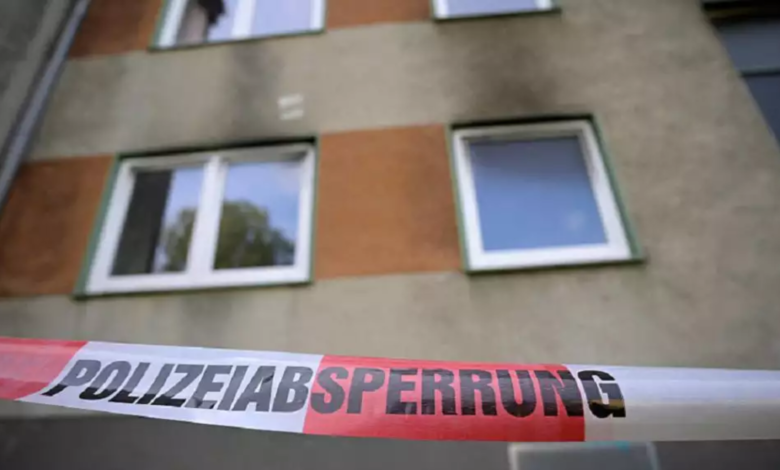Machete-Wielding Palestinian Migrant Injures 31 in German Attack

In recent news from Germany, a horrifying incident has taken place that left 31 people injured. The attacker, a Palestinian migrant, wielded a machete and carried out a brutal assault in the heart of the city. This shocking act of violence has sparked widespread concern, not just in Germany, but across Europe, raising difficult questions about safety, immigration, and the responsibility of governments in handling such incidents.
In this blog post, we will explore the details of the incident, the background of the attacker, the impact on the community, and the broader implications of this attack. Read on to gain a deeper understanding of this tragic event and the broader issues surrounding it.
The Machete Attack: What Happened?
On the morning of the attack, panic spread through a busy public area in Germany. Authorities reported that the suspect, a man who had recently arrived in the country as a migrant, began randomly attacking pedestrians with a machete. The attack occurred in a densely populated region, making it particularly terrifying for those nearby.
Witnesses reported seeing the attacker running through the area, striking anyone within reach. People scrambled to escape, and some were left severely wounded. By the time the authorities arrived on the scene, the damage had already been done. 31 individuals were injured, with several requiring immediate medical attention for life-threatening injuries.
Authorities quickly apprehended the suspect, who was reportedly in his late twenties. He was detained at the scene and taken into custody without further incident. The police have yet to release full details about his motivations, but it is clear that this was an unprovoked and senseless attack.
Who Was the Attacker?
The suspect involved in the machete attack was a Palestinian migrant who had recently arrived in Germany. While initial reports suggest that he had been living in Germany for a short period, authorities have not confirmed the exact timeline of his arrival or the circumstances under which he entered the country.
Migrant-related incidents of violence have been a subject of debate in many European countries, and this attack has sparked renewed discussions about immigration policies. However, it is essential to note that this incident appears to be an isolated case, and the vast majority of migrants in Germany are peaceful members of society.
The attacker’s background is still being investigated, and there has been no clear explanation of what led him to carry out such a violent act. Some reports suggest that he may have been suffering from mental health issues, but further details are awaited.
The Immediate Aftermath: Injuries and Responses
The attack left a deep impact on both the victims and the community. Of the 31 people injured, some sustained life-threatening wounds, while others suffered minor injuries. Emergency services were quick to respond, with medical teams rushing to the scene to treat the wounded. Hospitals in the area were placed on high alert, and additional resources were deployed to handle the situation.
The police also quickly closed off the area to secure the scene and prevent further harm. The attack disrupted normal life in the area, with schools, businesses, and public transport affected by the lockdown. The authorities have pledged to investigate the incident thoroughly and ensure the safety of citizens in the future.
The Community’s Shock and Fear
For the people who witnessed the attack or were affected by it, the incident has left a lasting psychological impact. Residents and tourists in the area have expressed feelings of shock, fear, and unease. People are now questioning their safety in public spaces, and the authorities are under pressure to implement stricter security measures.
The incident has also sparked a debate on the integration of migrants into German society. Some argue that such attacks highlight the challenges faced by migrants in adapting to a new culture and society, while others point out that the vast majority of migrants contribute positively to the country.
It’s important to note that while migrant-related violence is a complex issue, the actions of one individual should not be used to generalize an entire group of people. Most migrants are fleeing violence, poverty, and war, and they come to Germany in search of a better life, not to harm others.
Germany’s Response to the Attack

The German government has condemned the attack and promised to take swift action to address the situation. Chancellor Angela Merkel and other officials have expressed their solidarity with the victims and their families, vowing to support the injured and provide them with the necessary care.
In addition, the German authorities have pledged to increase security in public areas, particularly in locations where large crowds gather. They are also looking into the background of the attacker to understand the motivations behind the act.
There have been calls for a more comprehensive approach to immigration and integration, with some political groups advocating for stricter border controls and better support systems for migrants. Others, however, caution against making generalizations based on the actions of a single individual.
The Broader Implications: Immigration and Security
The machete attack in Germany has brought to light several important issues that are at the heart of the ongoing debate about immigration and national security in Europe. The rise of terrorist attacks and violent incidents carried out by migrants in recent years has led to growing concerns about the safety of citizens and the ability of governments to effectively manage immigration.
Many European countries, including Germany, are grappling with how to balance the need for compassion and humanitarian support for refugees with the need to maintain public safety. While migration offers opportunities for economic growth and cultural exchange, it also presents challenges in terms of integration, social cohesion, and security.
In the aftermath of the attack, there have been calls for better mental health support for migrants, as well as stronger vetting processes to ensure that individuals with violent tendencies do not gain entry to the country. However, critics argue that such measures could unfairly discriminate against innocent migrants who pose no threat to society.
Conclusion
The machete attack carried out by a Palestinian migrant in Germany is a tragic reminder of the challenges surrounding immigration, security, and integration in Europe. While the incident has left 31 people injured and sparked fear in the community, it is essential to avoid making hasty generalizations about all migrants based on the actions of one individual.
The German government and law enforcement agencies are taking swift action to investigate the attack and ensure the safety of citizens. At the same time, this incident highlights the need for continued discussions on how to effectively address the complexities of migration while balancing public safety and humanitarian values.
In the end, it is crucial that societies work together to foster integration, provide support for vulnerable individuals, and strengthen security measures to prevent such attacks from occurring in the future. Only through understanding, cooperation, and compassion can we hope to build safer and more inclusive communities for all.
FAQs
What caused the machete attack in Germany? The specific motivations behind the attack are still under investigation, but early reports suggest mental health issues might have played a role.
How many people were injured in the attack? A total of 31 people were injured, some with life-threatening wounds, while others had more minor injuries.
Who was the attacker? The attacker was a Palestinian migrant who had recently arrived in Germany. His background is still being investigated.
What is Germany doing in response to the attack? Germany is increasing security in public spaces and investigating the attacker’s motivations to ensure the safety of citizens.
Was the attack an act of terrorism? At this point, the attack does not appear to be related to terrorism. It seems to have been an unprovoked act of violence.
How is the community reacting? The community is in shock and fear, with many questioning their safety in public spaces. Authorities are working to reassure the public and prevent further incidents.

